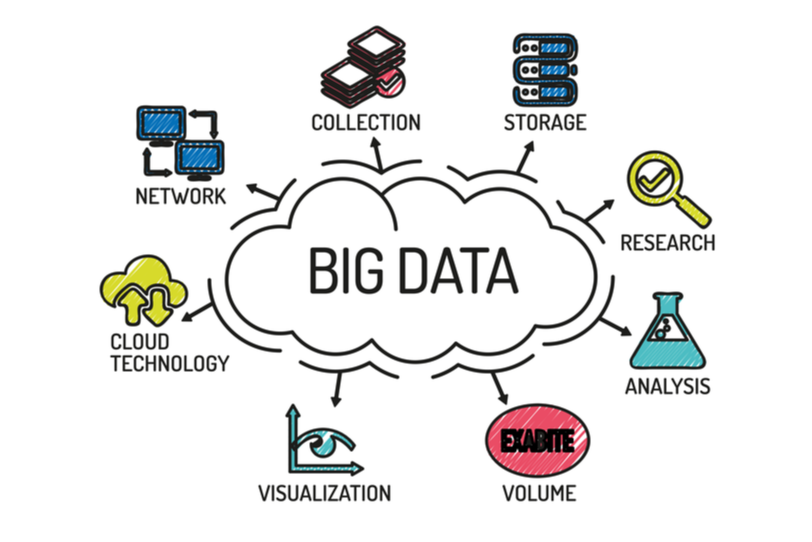In today’s world, data is being generated at an unprecedented rate. It is estimated that by 2025, the world will produce 463 exabytes of data per day. With such a massive amount of data being generated, it becomes crucial to make sense of it all. This is where Big Data comes in.
Big Data refers to the collection, processing, and analysis of large and complex data sets that traditional data processing methods cannot handle. In this article, we will discuss what Big Data is, why it’s important, applications of Big Data, and how organizations can leverage Big Data to achieve success.
Contents
What is Big Data?
Big Data refers to the massive volume of structured, semi-structured, and unstructured data that is too complex and too large to be processed by traditional data processing tools.
This data can be generated from various sources such as social media, online transactions, IoT devices, and many others. Big Data has three main characteristics. They are:
- Volume
- Velocity
- Variety
Why is Big Data important?
Big Data is important because it provides valuable insights that can help organizations make informed decisions. With Big Data, organizations can identify patterns, trends, and relationships that would have otherwise gone unnoticed. This can help organizations optimize their operations, improve their customer experience, and make better business decisions.
Some of the Benefits of Big Data include:
1. Better decision-making. Big Data provides valuable insights that can help organizations make better business decisions. With Big Data, organizations can identify patterns, trends, and relationships that would have otherwise gone unnoticed.
2. Improved customer experience. Big Data can help organizations understand their customers’ needs, preferences, and behavior. This can help organizations improve their products and services and provide a better customer experience.
3. Cost reduction. Big Data can help organizations optimize their operations and reduce costs. For example, by analyzing data from sensors in manufacturing plants, organizations can identify inefficiencies and improve their processes.
4. New revenue streams. Big Data can help organizations identify new revenue streams. For example, by analyzing customer data, organizations can identify new products or services that their customers might be interested in.
5. Improved Products and Services. Big data can provide organizations with insights into customer needs and preferences, allowing them to develop products and services that better meet their customers’ needs.
Applications of Big Data:
- Healthcare: Big Data can be used to improve healthcare outcomes by analyzing patient data to identify trends and patterns.
- Finance: Big Data can be used in finance to detect fraud, optimize investments, and improve risk management.
- Retail: Big Data can be used in retail to personalize the customer experience, optimize inventory management, and improve supply chain management.
- Manufacturing: Big Data can be used in manufacturing to optimize production processes, improve quality control, and reduce downtime.
How Organizations can Leverage Big Data for Success
1. Define clear goals.
Organizations need to define clear goals before they start collecting and analyzing Big Data. This will help them focus on what they want to achieve and avoid getting lost in the data.
2. Invest in the right tools.
Organizations need to invest in the right tools to collect, process, and analyze Big Data. This may involve using cloud-based platforms or specialized software.
3. Hire the right people.
Organizations need to hire people with the right skills to analyze Big Data. This may involve hiring data scientists, data analysts, or data engineers.
4. Prioritize data security.
Organizations need to prioritize data security to protect sensitive information from cyber threats. In recent times Data Protection concerns have become mainstream therefore it has never been more urgent to address these concerns.
Key take-aways
In conclusion, Big Data is a game-changer that can help organizations make informed decisions, improve customer experience, reduce costs, and identify new revenue streams. By leveraging Big Data, organizations can achieve success in today’s data-driven world. However, to do so, they need to define clear goals, invest in the right tools, hire the right people, and prioritize data security.
To effectively, implement Big Data in your organization, you need robust training on Data Science. Register now to expand your knowledge on Big Data and reap its benefits!
We have a firm belief that every organization has a unique purpose only they can fulfil in this world. We work with you in organizing your resources to exploit opportunities so that you can fulfil your purpose and realize full potential. We build the capacity of people, processes and systems for organizational success and growth as well as nurturing a thriving ecosystem.
Ready to enhance your skills and boost your career? Explore our corporate training programs now and start your journey to success.









Comment here